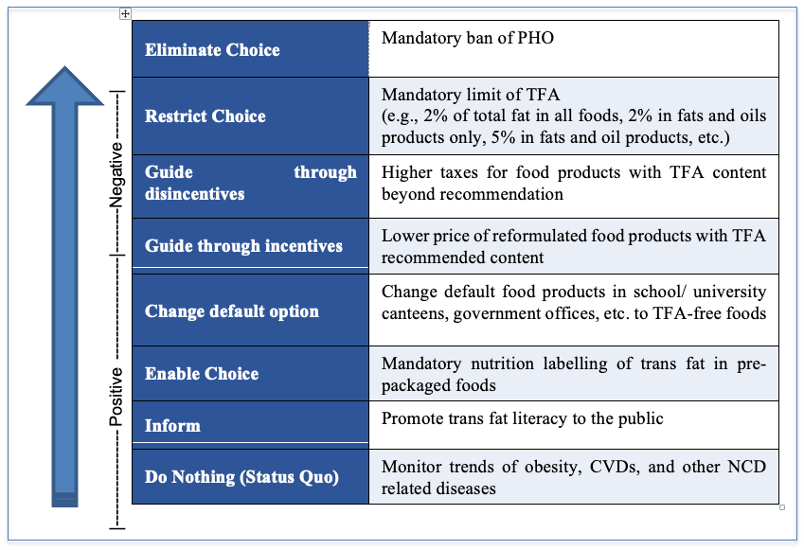VOLUME 15 (Supplement)

SciEnggJ 15 (Supplement) 055-062
available online: December 31, 2022
*Corresponding author
Email address: mmzarsuelo@up.edu.ph
Date received: March 01, 2022
Date revised: July 06, 2022
Date accepted: September 30, 2022
ARTICLE
Trans fat policy as pathfinder to curb noncommunicable disease: a review in Philippine perspective
National Institutes of Health, University of the Philippines Manila,
Manila 1101, Philippines
Globalization brings tremendous industrial and economic progress. However, its impact to population health includes dietary transition, satisfying appetite for processed foods of which some contain trans fatty acids (TFA). Intake of TFA has been linked to increased prevalence of cardiovascular diseases and is contributory to other noncommunicable diseases (NCDs). This article provides context on the role TFA in the development and burden of NCDs. The authors reviewed health effects of regulations of selected countries, and possible alternative policy actions. Search of related records was conducted from various sources including grey literature given the limited published articles on TFA in the Philippines. Selection criteria of the review included topic relevance, year of publication, and related contents. In total, 61 records were used in the review. In the Philippines, NCDs are estimated to contribute to 67% of mortality, with cardiovascular diseases (CVDs) as the leading cause. In another study, estimated annual number of coronary heart disease deaths due to high TFA intake was at 3,067. Partially hydrogenated oils are the major source of industrially-produced TFA. The World Health Organization sets global leadership on its elimination by 2023 through the REPLACE package launched in 2018. Therein, interest of governments gradually transitioned to commitment, taking legislative actions of varying scope to curb increasing TFA intake, with different levels of regulation. In the span of two years, 33 countries adopted mandatory limits of TFA. In the Philippines, the Department of Health has taken strides in advancing TFA regulation through Administrative Order (AO) 2021-0039. There is a need to 1) promote TFA literacy; 2) ensure accessibility, technical competence, and affordability of laboratories nationwide for TFA content analysis; and 3) provide assistance to small- to medium-scale food manufacturers including but not limited to financial and technical resources to comply with the set regulations. These may be achieved through: 1) creation of a technical working group, convening experts in drafting of a Republic Act; 2) funding and conduct of more research on current TFA intake as baseline economic valuation and health effects of proposed bans on TFA; and others.
© 2024 SciEnggJ
Philippine-American Academy of Science and Engineering